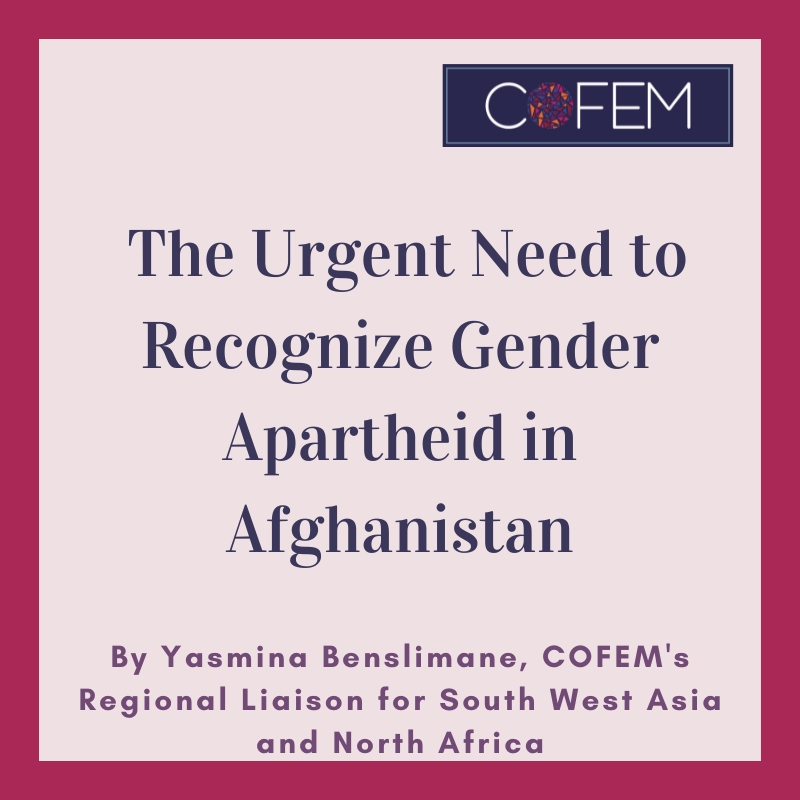The horrific situation for women’s rights in Afghanistan has worsened drastically since the U.S. withdrawal and the Taliban’s return to power in August 2021. And it is barely getting enough coverage. It has now been over 1000 days since they banned girls from attending school beyond the sixth grade, making Afghanistan the only country in the world with such restrictions and making it the only country in the world that takes away the inalienable right to education only to girls, ripping away their most powerful tool. The new “morality law” is deeply concerning as it is completely erasing women from public life, not allowing them to sing, speak, or expose faces.
The Taliban have systematically violated the rights of women and girls, issuing over 100 edicts that cruelly target and oppress them. This relentless assault on women’s freedoms is a women’s rights and human rights crisis that impacts every layer of society, particularly minoritized communities, including women from Hazara and Tajik ethnicities. Women and girls face severe restrictions on freedom of movement and dress codes that are a stain of the patriarchy and an attack on their bodies. Women are forced to cover themselves entirely in public and often require a male guardian to leave their homes, stripping them of autonomy and mobility. Beyond girls being banned from school, women are restricted from working in several sectors, completely erasing their existence from public and professional spheres of everyday life. Women are entirely excluded from the judicial system, with no female judges, prosecutors, or lawyers allowed. Parks, gyms, and beauty salons that served as safe spaces for women have been shut down, further isolating and dispersing them. A complete patriarchal society by excellence.
Women’s rights activists who dare to protest these restrictions face arbitrary detention, torture, and exile, silencing voices of resistance and advocacy. Afghanistan now ranks last on the Women, Peace, and Security Index. This systematic oppression amounts to gender apartheid, with the Taliban creating the world’s most severe women’s rights crisis. Gender apartheid refers to the systematic segregation, discrimination, and oppression of individuals based on their gender, depriving them of fundamental rights and freedoms. This concept emerged from the experiences of Afghanistani women under the Taliban in the 1990s and gained prominence after the Taliban’s return to power in 2021. The term ‘Afghanistani’ refers to anyone with Afghan nationality, regardless of race or background, as ‘Afghan’ is often associated mainly with Pashtun people. Gender apartheid is intrinsically linked to gender-based violence (GBV) and violence against women and girls (VAWG), as it institutionalizes and perpetuates such abuses.
The international response has been heavily criticized, drawing parallels to the historical impacts of colonialism and the dehumanization of people of color, particularly women and girls. These factors have contributed to the current state of gender apartheid, where they are systematically oppressed and excluded from critical discussions. This exclusion underscores the ongoing marginalization and perpetuation of a legacy of discrimination and neglect, as exemplified by the Doha III meeting scheduled for June 30 to July 1, 2024. This UN-convened gathering, featuring senior diplomats and special envoys on Afghanistan, marks the first time the Taliban government will participate in a UN event. This exclusion perpetuates the ongoing silencing of women’s voices, denying them a platform to advocate for their rights and contribute to peace-building efforts. Despite the critical role women play in society and the alarming impact of Taliban policies on their lives, their perspectives and demands are constantly ignored. Shahrbanu Haidari, a passionate advocate for women’s rights and co-founder of Associazione Solidarietà Donne per le Donne (ASDD), underscores this urgency in her article on the UN-convened Doha III meeting. She highlights the profound concern over the exclusion of human rights and women’s rights from the agenda, stating, “The revelation that the meeting will focus solely on drugs, the economy, and private business has deeply unsettled many women in Afghanistan and concerned individuals globally.”
Codifying gender apartheid as a crime against humanity under international law would give a clear legal avenue to hold perpetrators accountable. It would equip the international community with a powerful tool to prevent and punish the full scale of VAWG. An inclusive definition would make visible the longstanding discrimination faced by women, girls, and LGBTQIA+ people when enforced through crimes as part of institutionalized regimes of oppression. The #EndGenderApartheid Manifesto, launched by Politics4Her Europe Hub and ASDD, calls for urgent international action against the systemic oppression of women and girls in Afghanistan under Taliban rule. Highlighting the stripping of basic rights and resulting mental health crises, the manifesto seeks to recognize gender apartheid as a crime against humanity.
The situation in Afghanistan represents an unprecedented humanitarian crisis, and recognising gender apartheid as a crime against humanity is a fundamental political necessity. Each of us can play our part, starting with adding your signature to this petition launched by Politics4Her and ASDD.
